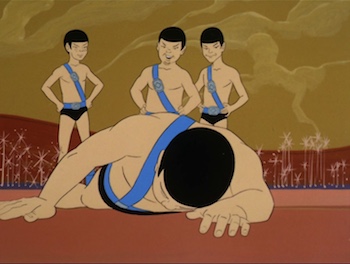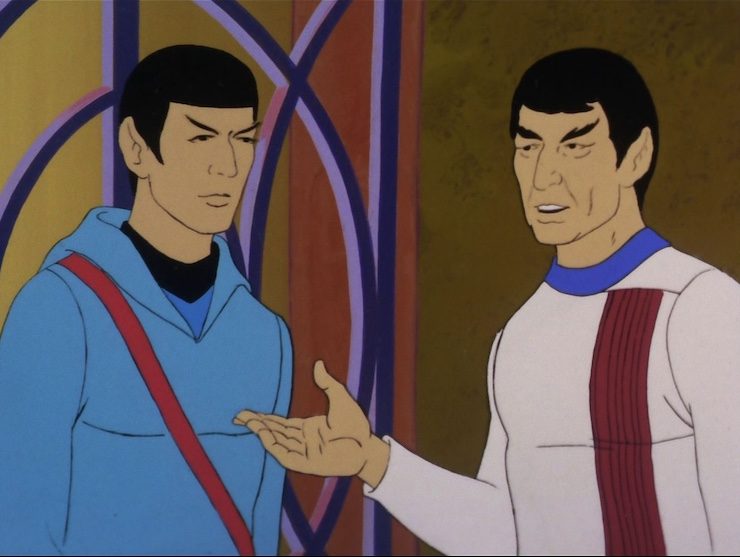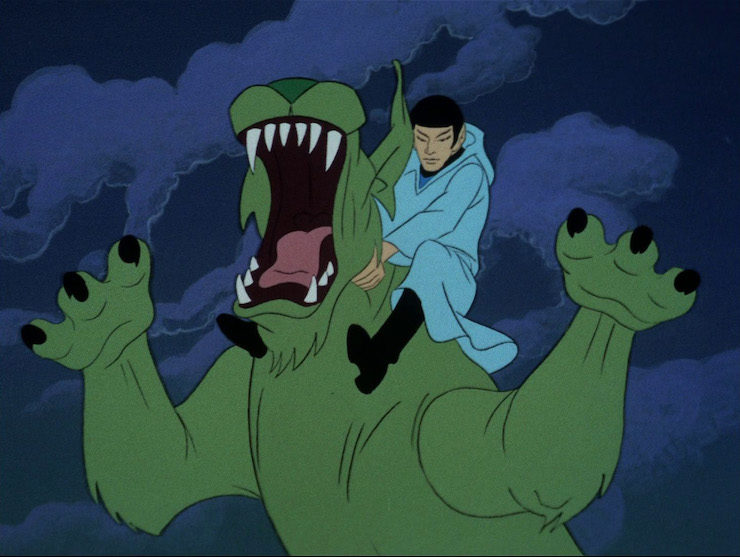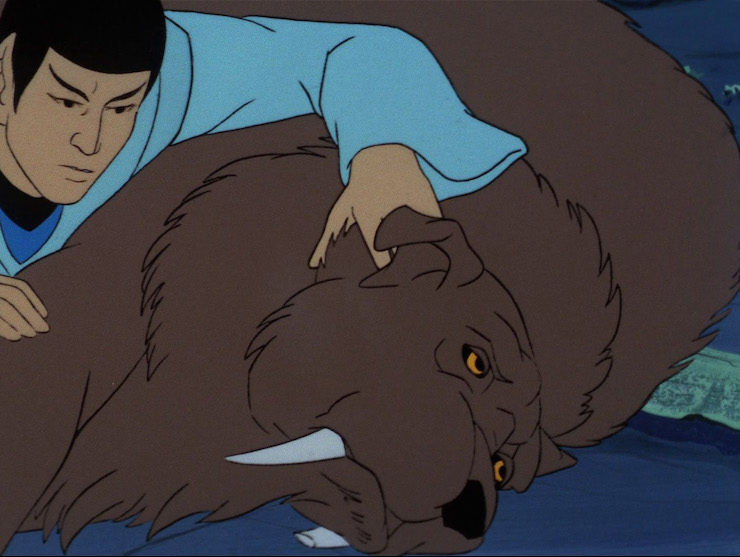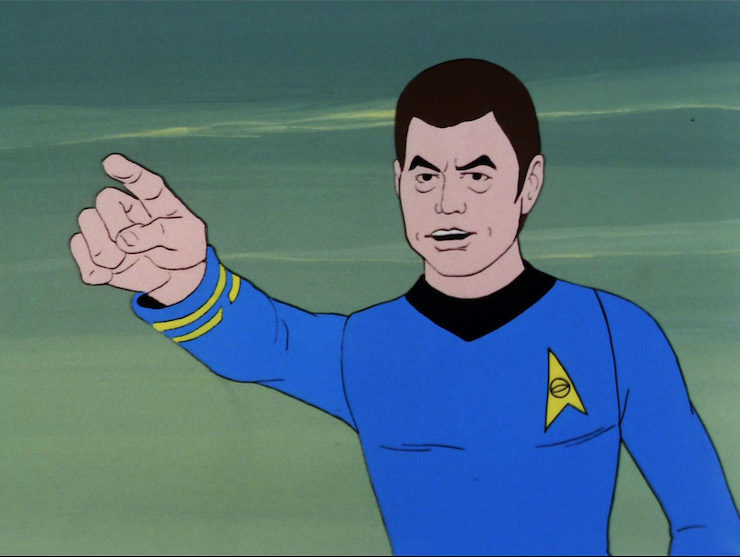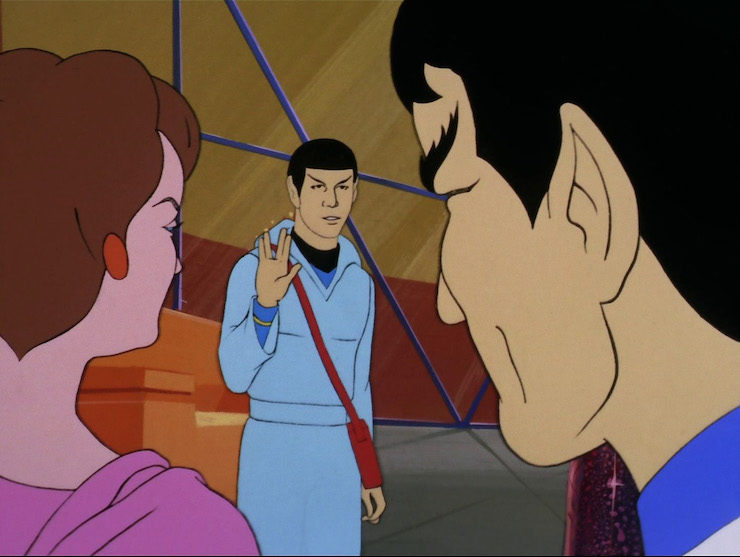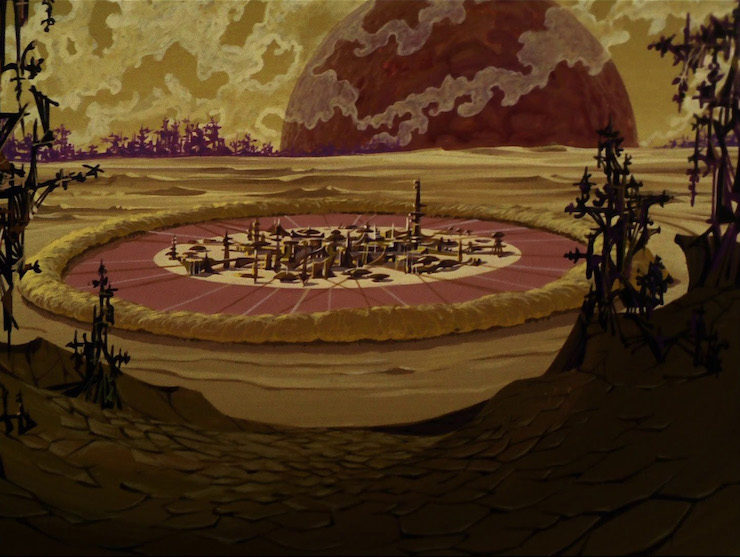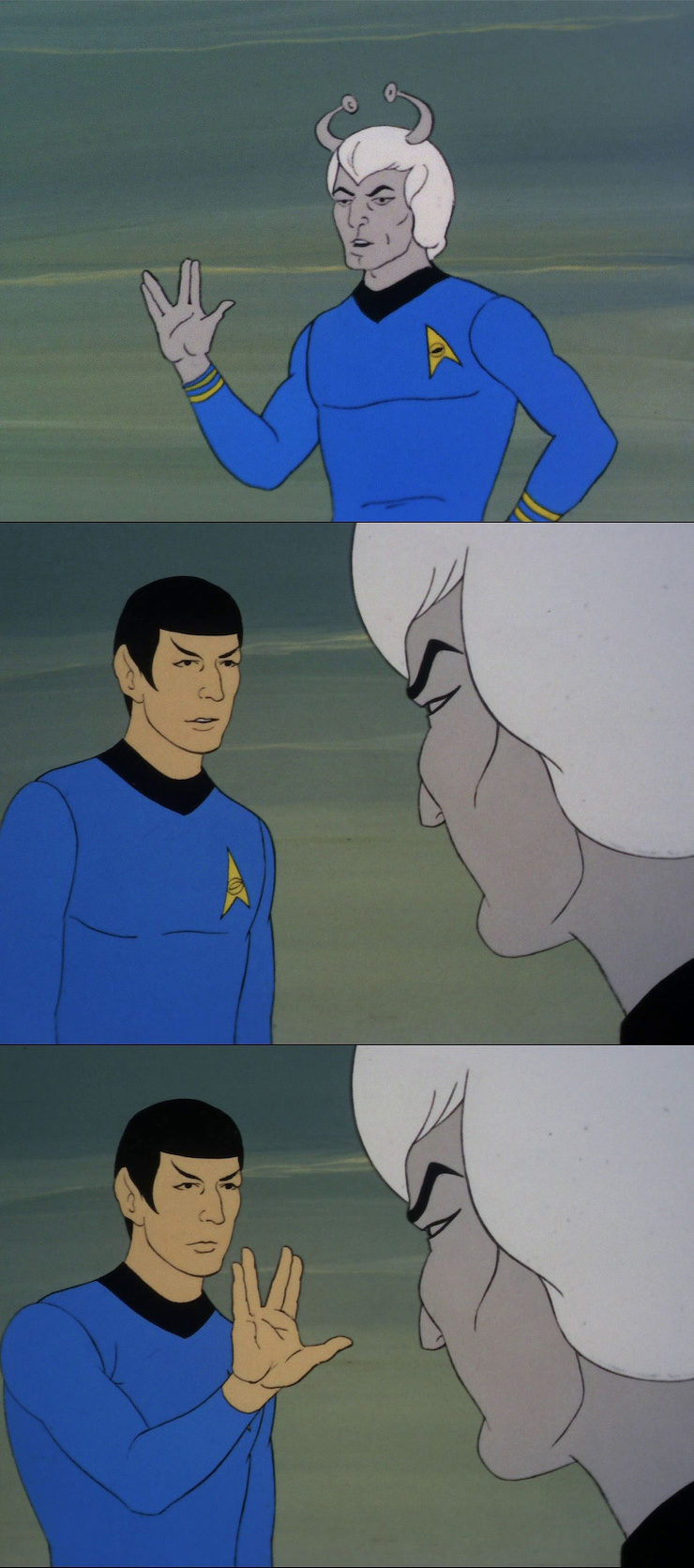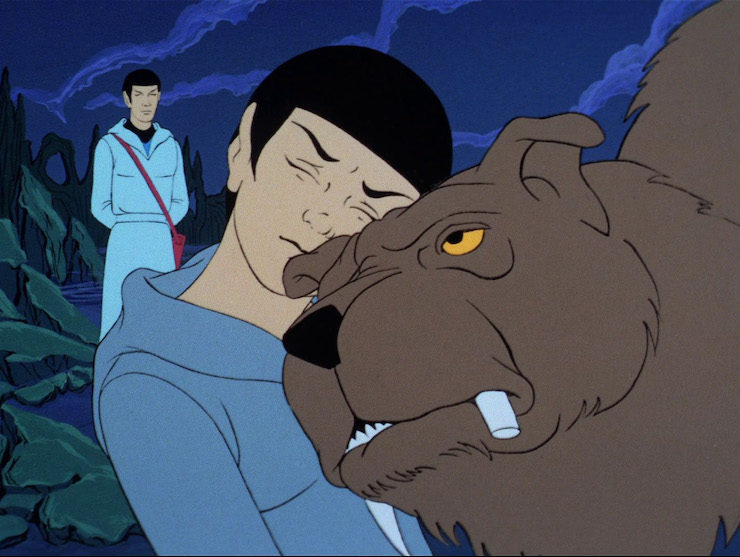“Yesteryear”
Written by D.C. Fontana
Directed by Hal Sutherland
Animated Season 1, Episode 2
Production episode 22003
Original air date: September 15, 1973
Stardate: 5373.4
Captain’s log. The Enterprise has taken a team of historians to the planet with the Guardians of Forever. Kirk, Spock, and Erickson, a historian, have gone through the Guardian to observe the early days of the Orions. When they return, no one recognizes Spock, and when they beam back to the Enterprise, Commander Thelin, an Andorian, is Kirk’s first officer of five years’ standing. A computer search reveals that Ambassador Sarek did have a son named Spock by Amanda Grayson, but he died at the age of seven, after which the couple separated. Amanda was later killed in a shuttle accident.
Spock is recorded as having died during his kahs-wan, a maturity ritual, but according to Spock’s memory, he survived the kahs-wan (obviously) and his life was saved by his cousin Selek. But he’d never met that cousin before or since, and he realizes now that it was Spock himself going back in time. So he obtains a contemporary Vulcan wardrobe and goes through the Guardian.
He encounters himself being tormented by children, who make fun of him for his halfbreed status, then “meets” Sarek, to whom he introduces himself as Selek, and says he’s en route to the family shrine. Sarek offers him hospitality, which “Selek” accepts.
While Sarek lectures young Spock about how he must choose between his Vulcan and human heritage, old Spock speaks with Amanda about how Spock will find his way, even if Sarek is so demanding.
Young Spock sneaks out at night to undergo the kahs-wan before the appointed time, though his pet sehlat, I-Chaya, insists on going along. Young Spock is attacked by a le-matya, but between them, I-Chaya and old Spock save the boy.
As they traverse the desert, young Spock complains about the expectations of his father and the emotionalism of his mother. Old Spock tells him that having human blood isn’t fatal, and to remember that Vulcans aren’t unemotional, they simply repress their emotions.
I-Chaya falls ill, and both Spocks realize that he was poisoned by the le-matya—which old Spock has no memory of, in fact, I-Chaya lived beyond this date. Old Spock offers to fetch a healer, but young Spock insists on going himself, leaving old Spock to care for the animal. He uses a mind-meld to comfort the sehlat.
Young Spock fetches the healer, but by the time they arrive, it’s too late—the poison has gone too far in I-Chaya’s system, and he’s beyond the healer’s ability to cure. Young Spock makes the decision to euthanize the animal without tears, then when he returns home he tells Sarek and Amanda that he has chosen a Vulcan way of life for himself. He then goes off to find the kids who made fun of him, as old Spock taught him how to do a neck pinch properly, because that’s totally in keeping with Vulcan philosophy…
“Selek” says his goodbyes to Sarek and Amanda, asking the former to try to understand his son. He returns through the Guardian to find that all is normal again, except for I-Chaya’s premature death.
Can’t we just reverse the polarity? Where the Guardian of Forever was previously only able to show history at ludicrous speed and you had to jump and hope for the best, now you can request a particular time and date and get there. Go fig’.
Fascinating. Vulcan children have to undergo a maturity ritual that—like the koon-ut-kalifee from “Amok Time“—is a relic of their pre-logic days that they hang onto for no compellingly good reason. Letting a kid go out in a brutal desert for days without food and water strikes me as more than a little crazy.
I’m a doctor not an escalator. When the timeline is restored, McCoy is in full-on crotchety mode, bitching about having to recalibrate his medical instruments for Vulcans every time he does a physical.
I cannot change the laws of physics! It isn’t until Scotty doesn’t recognize Spock that Kirk realizes that something’s up, since he assumes that McCoy not recognizing him is just McCoy being a dick.
Channel open. “In the family, all is silence. No more will be said of it.”
Old Spock talking to Sarek and proving that Vulcans have embarrassing family stories they won’t tell, too.
Welcome aboard. Mark Lenard reprises his role as Sarek from “Journey to Babel,” while future radio personality Billy Simpson provided the voice of young Spock, a rare case of actual guest casting on the animated series. Simpson was the first person other than Leonard Nimoy to play Spock (well, you could argue for Majel Barrett in “Return to Tomorrow“…..).
Other voices are provided by Barrett (as Amanda, the character also returning from “Journey to Babel,” and the historian), James Doohan (who does Scotty as usual, and many of the other male voices, including the Guardian of Forever), and various Filmation regulars, among them Hal Sutherland’s son Keith.
Trivial matters: This episode serves as a sequel to both “Journey to Babel” (which introduced Spock’s parents, as well as Spock’s pet sehlat) and “The City on the Edge of Forever” (which introduced the Guardian of Forever).
Amanda’s last name of Grayson is established in this episode.
The history of the alternate timeline in which Spock died as a boy was chronicled in The Chimes at Midnight by Geoff Trowbridge, a short novel that was published in Myriad Universes: Echoes and Refractions, and which retold the TOS movies with Thelin in Spock’s place.
Although she served as associate producer and story editor for the animated series, this is D.C. Fontana’s only script for it.
This episode introduces Vulcan’s Forge and the city of ShiKahr, which will continue to be referenced in the tie-in fiction and, in the case of the former, on Enterprise in the three-parter “The Forge”/”Awakening”/”Kir’Shara.”
Despite “The Man Trap” establishing that Vulcan has no moon—and despite notes on the cels by both Fontana and Gene Roddenberry saying “NO MOON!”—the animators put a moon in Vulcan’s sky. The original release of The Motion Picture did the same thing—tie-in fiction has established it as T’Khut (or T’Rukh), based on an article by Gordon Carleton in the 1975 fanzine Warp Speed 8), which stated that Vulcan had a sister planet.
For many years, Roddenberry declared the animated series not to be part of the overall Trek canon. The one exception was this episode, only because Sarek made explicit reference to the events of the episode in “Unification I” on TNG. Other animated series references would creep in here and there, though up until 1991, the tie-in fiction was explicitly forbidden from referencing anything from the series. (In the monthly DC comic, they were forced to change Arex and M’Ress to Ensign Fouton and Ensign My’ra.) At this point, 25 years after Roddenberry’s death, most people accept that it’s part of the overall storyline.
Spock being taunted as a boy by full-blooded Vulcan children will be seen again in the 2009 Star Trek.
Thelin’s skin was supposed to come out more blue, like other Andorians. Enterprise would later establish the albino Aenar as other natives of Andoria, and The Chimes at Midnight would establish that Thelin was half-Aenar, thus explaining his pale skin.
The historian was given the name of Grey in the script, with Alan Dean Foster giving her the first name of Jan in the adaptation of this episode in Log 1. Christopher L. Bennett made her a major player in the founding of the Department of Temporal Investigations in the novel Forgotten History, which established her full first name as Meijan.
At no point in the episode as aired is the redshirt who accompanied Kirk and Spock to Orion’s past identified. In the script, he’s established as ship’s historian Erickson. I honestly thought he was a security guard (although the last historian we saw, McIvers in “Space Seed,” also wore red for whatever reason).
NBC expressed concern over the death of I-Chaya, which was heavy subject matter for a Saturday morning kids show in 1973, but Filmation retained complete creative control and they insisted on keeping it. After the episode aired, neither NBC nor Filmation nor Roddenberry nor Fontana ever received a single complaint about the portrayal of a pet’s death.
To boldly go. “Times change, Doctor—times change.” This is generally regarded as the best of the animated episodes, and watching it again, I find myself being disappointed.
Oh, let’s be clear here, it’s a very good episode, but there are a few things that knock it down off the pedestal a bit, mostly in the early going.
For starters, the Guardian of Forever is nothing like it was in “The City on the Edge of Forever“—it speaks in a direct manner, and James Doohan eschews Bart LaRue’s stentorian tones, instead sounding like an old man with asthma who gives irritatingly straightforward answers.
In addition, Spock’s elimination from history makes no sense. How does the team of historians looking at Vulcan’s past change the timeline? Yes, Spock was busy staring at early Orion, but if he hadn’t, he’d have been on the planet or on the Enterprise or some such. Why would just the act of looking at it cause that change in history?
Having said all that, once the story sends Spock to Vulcan’s past, it gets interesting. It’s a little thing, but just the fact that Spock was taunted for being a halfbreed puts so much of his character into focus: his insistence on identifying himself as Vulcan even though he’s a Vulcan/human hybrid, his disdain for human emotionalism, his complete embrace of Vulcan logic even when it costs him. And it makes sense that Vulcan children would be bullies—every Vulcan we’ve met so far (Sarek, Spock, T’Pring, T’Pau) has been arrogant and high-handed, and the behavior of the children is pretty much the same thing without the veneer of emotionalism.
Seeing I-Chaya, the “teddy bear” mentioned in “Journey to Babel,” is a delight, and watching him die is awful, but this is the good kind of awful. It’s supposed to be painful, and an important moment for Spock. You have to wonder if another influence on his embracing Vulcan logic and emotion suppression was to avoid having to feel the hurt of I-Chaya’s loss so keenly.
It helps immensely that Mark Lenard returns to voice Sarek. His conversations with Spock would have had much less impact with James Doohan (who had actually recorded Sarek’s lines before Lenard became available, and so the latter was looped in) doing the voice. Jane Wyatt was unavailable, but at least Majel Barrett does a decent job of getting Wyatt’s tone and tenor right as Amanda.
Overall, this is a strong character study of Spock, and that’s enough to ameliorate the plot’s general lack of sense.
Warp factor rating: 8
Next week: “One of Our Planets is Missing”
Keith R.A. DeCandido has three new eBook novellas in the Super City Cops series available for preorder from Bastei Entertainment. These stories about police struggling to do their job in a city filled with costumed heroes and villains will be released over the next three months and include Avenging Amethys, Undercover Blues, and Secret Identities. Covers, promo copy, and preorder links can be found on Keith’s blog.










